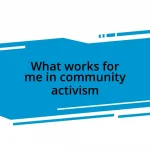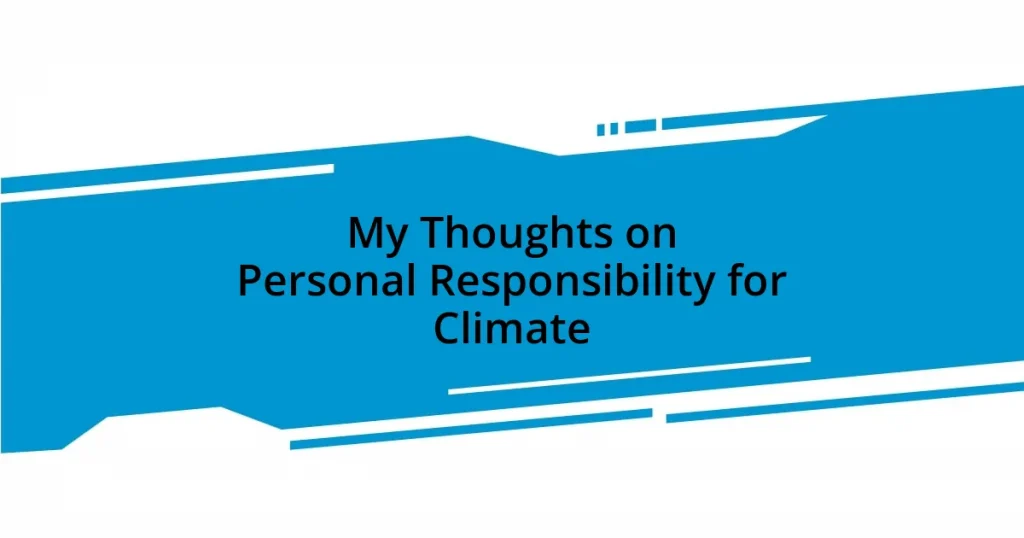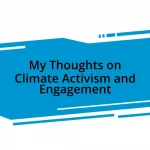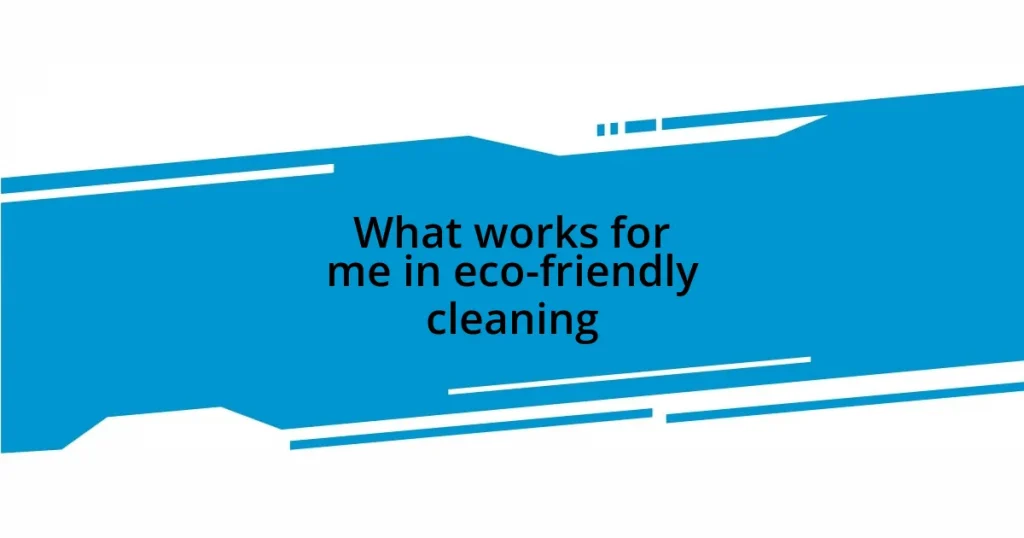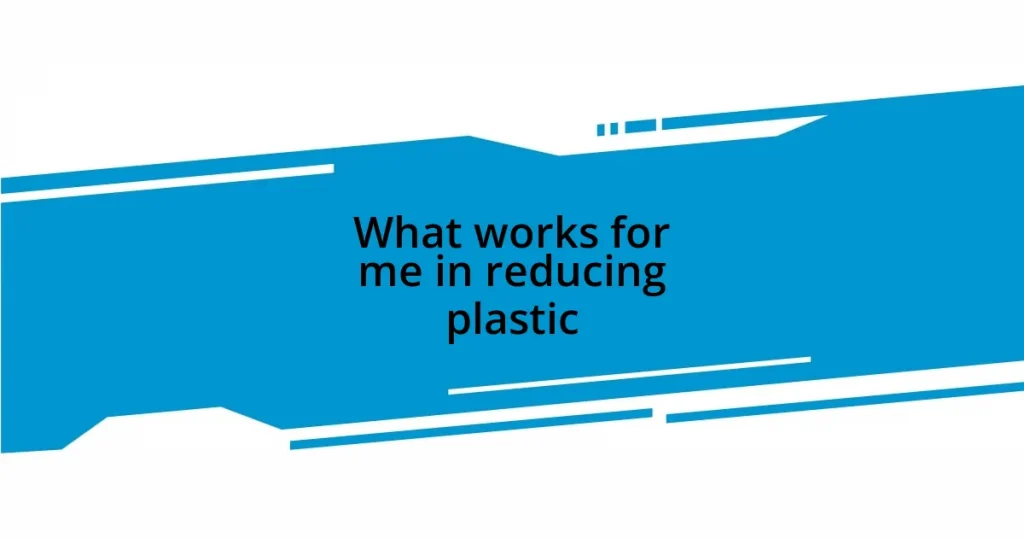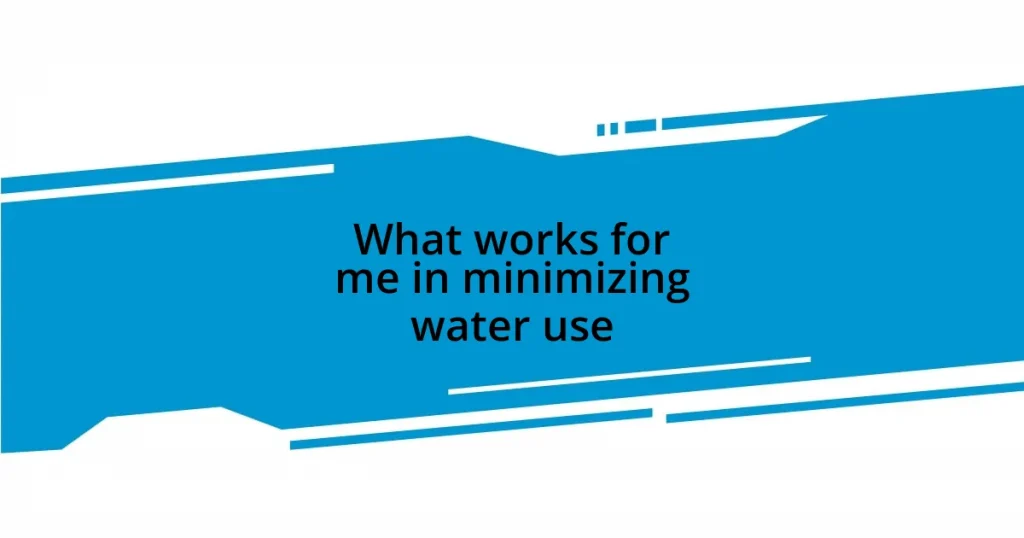Key takeaways:
- Personal responsibility is empowering; even small daily choices, like using reusable bags, contribute to significant positive change.
- Climate awareness prompts informed choices, community engagement, and collective action for environmental protection.
- Engaging in community initiatives, such as tree planting and recycling programs, fosters unity and amplifies efforts for sustainability.
- Advocating for policy changes reinforces the impact of individual actions and can lead to widespread community benefits, like increased use of renewable energy.
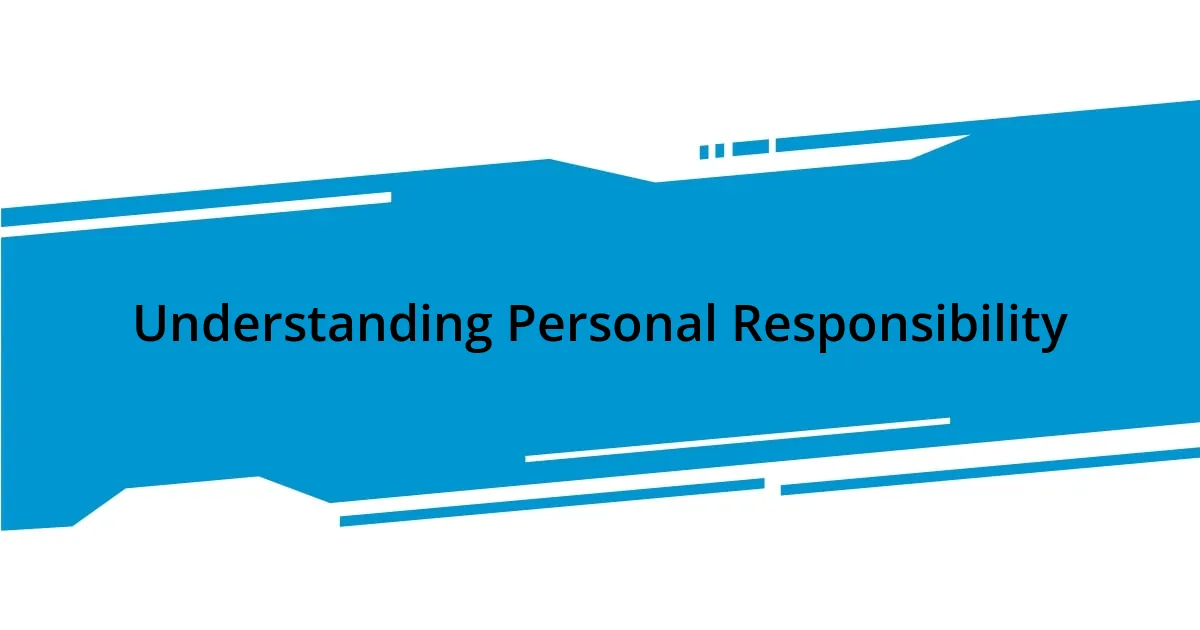
Understanding Personal Responsibility
Personal responsibility is often seen as a daunting concept, but I find it incredibly empowering. When I think about my daily choices—like opting for reusable bags during grocery shopping—I’m reminded that even the smallest actions contribute to a larger narrative. Isn’t it fascinating how a single decision can ripple outwards, inspiring others to reflect on their habits?
I remember a moment a few years ago when I had to decide whether to participate in a local cleanup event. Part of me thought it wouldn’t make a significant difference, but I chose to join anyway. As I worked alongside others, I felt a profound connection to my community and realized that personal responsibility is as much about engaging with others as it is about individual actions. What does personal responsibility look like in your life?
The truth is, personal responsibility involves more than just our physical choices; it encompasses our attitudes and beliefs. Have you ever experienced that moment of realization when you understand how your actions—like reducing waste or conserving water—can have broader environmental implications? I vividly recall the sense of purpose that washed over me when I realized that shifting my mindset around sustainability opened up a world of possibilities for positive change. Isn’t that what makes personal responsibility so impactful?
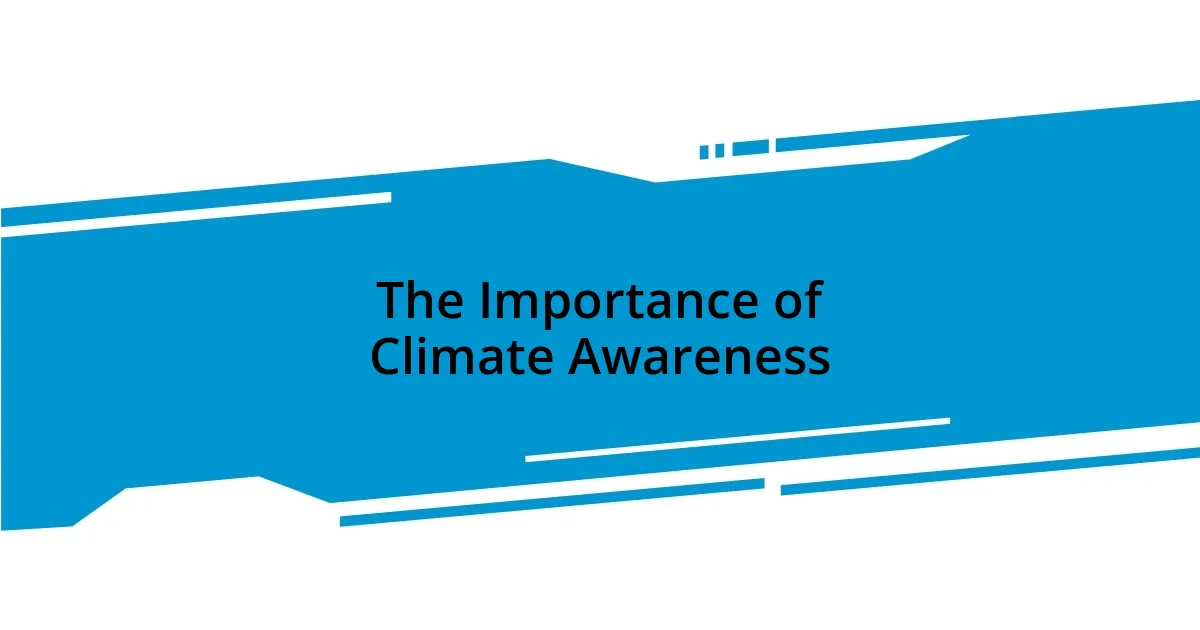
The Importance of Climate Awareness
Understanding the importance of climate awareness is pivotal in fostering a sense of responsibility. I recall a time when I was hiking in a beautiful national park, surrounded by towering trees and crystal-clear lakes. Upon seeing litter strewn about the trails, I felt a mix of disappointment and motivation. That experience drove home the reality that our actions, or lack thereof, directly influence the health of our environment. It’s a reminder that awareness isn’t just knowledge; it’s a call to action.
Here are some critical reasons why climate awareness is essential:
- Informed Choices: Understanding climate issues helps us make decisions that positively impact the environment.
- Community Engagement: When you’re aware, you’re more likely to engage with local sustainability initiatives.
- Amplifying Voices: Awareness enables us to support policies and movements advocating for climate protection.
- Inspiring Change: Educating ourselves can inspire those around us to consider their impact on the planet.
Each of these aspects transforms awareness into tangible actions that benefit not just us as individuals but our communities and the world at large.
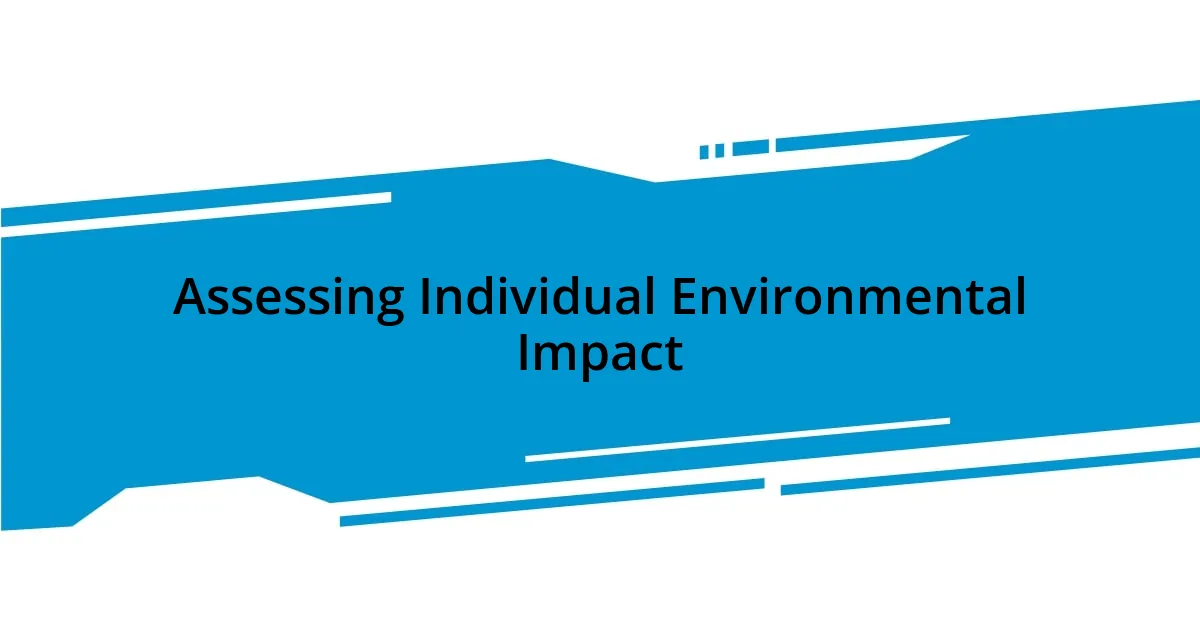
Assessing Individual Environmental Impact
Assessing our individual environmental impact can feel a bit overwhelming at first. However, breaking it down into manageable parts helps me gain clarity. For instance, I track my energy usage at home, and it’s eye-opening to see how switching off unnecessary lights has reduced my electricity bill while also lessening my carbon footprint. Have you ever checked how those small changes in your daily routine impact your overall consumption?
Moreover, I often hear people debating the significance of their choices in the face of global challenges. Yet, I remember when I began measuring my water usage. I discovered that simple habits, like shorter showers or fixing leaky faucets, have not only reduced my water bill significantly but also fostered a deeper appreciation for this precious resource. Isn’t it enlightening how these personal assessments lead to larger shifts in perspective and behavior?
Lastly, I encourage you to think about your own lifestyle. Have you considered what your diet contributes to your environmental footprint? After I researched the impact of meat consumption, I decided to incorporate more plant-based meals into my diet. This not only benefited my health but also reduced my ecological impact. By examining and adjusting our habits, we become more attuned to our environmental influence, and that awareness is crucial for meaningful change.
| Aspect of Impact | Individual Action |
|---|---|
| Energy Consumption | Switching off unused appliances and lights |
| Water Usage | Using less water and fixing leaks |
| Dietary Choices | Incorporating more plant-based meals |
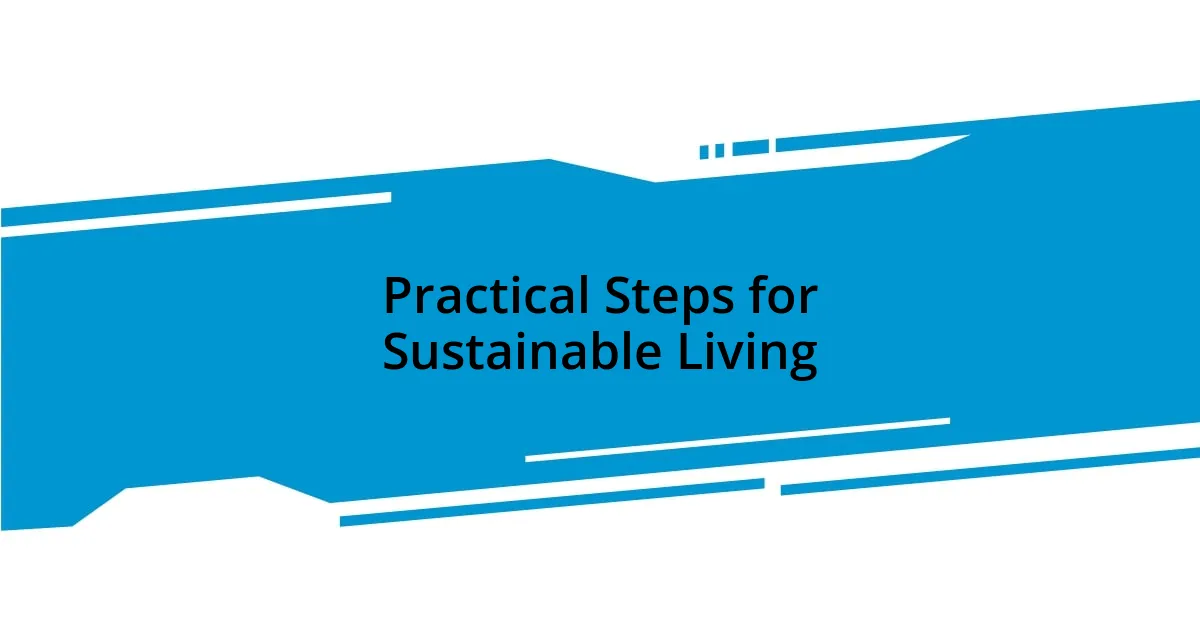
Practical Steps for Sustainable Living
Thinking about practical steps for sustainable living always gets me excited. One of the most rewarding changes I made was switching to reusable bags for my grocery shopping. I remember the first time I filled my tote with vibrant, fresh produce; it felt so good to know I was part of the solution, not the pollution. Not only do these bags cut down on single-use plastics, but they also remind me of the little choices that matter. What small changes have you tried that left you feeling empowered?
Another step I’ve taken is to embrace public transportation and biking. The first time I decided to cycle to work instead of driving, I experienced this refreshing sense of freedom. The morning air filled my lungs, and I discovered neighborhoods I’d never noticed before. Plus, consider the impact—fewer emissions and a positive effect on my mental health. Have you ever thought about how your commute could become more sustainable?
Lastly, I started a small garden at home, which has truly transformed my relationship with food. Tending to my veggies brings joy and a sense of accomplishment. When I bite into a ripe tomato, I feel a connection not just to my garden, but also to a more sustainable way of living. Have you ever grown anything yourself? It’s remarkable how such simple acts can deepen our appreciation for the earth and motivate us to live more sustainably.
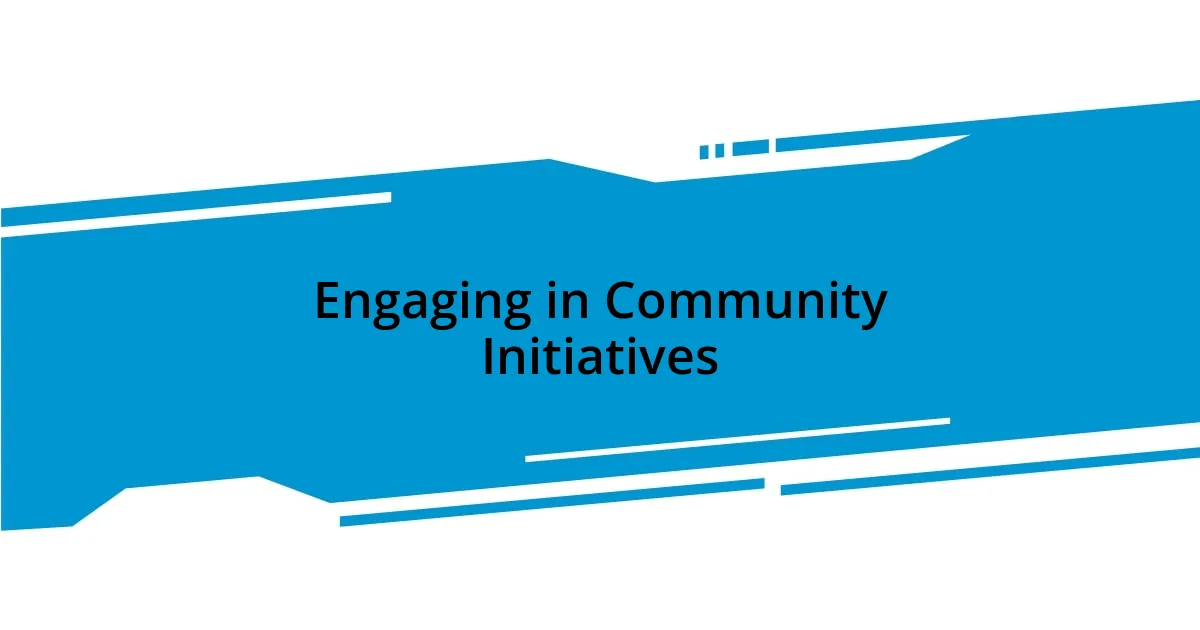
Engaging in Community Initiatives
Getting involved in community initiatives has been a transformative experience for my understanding of collective environmental responsibility. I vividly recall my first tree-planting event; the excitement in the air was palpable as neighbors gathered with shovels and saplings. Have you ever felt the sense of unity that comes from working alongside others for a common cause? It was not just about adding greenery to our park; it was about fostering connections that strengthen our commitment to a healthier planet.
Participating in local clean-up drives has also opened my eyes to the urgent need for action. I can still picture the moment I pulled a plastic bag from a tree—what a stark reminder of our impact! I remember talking to fellow volunteers and realizing that many were drawn to the event not just for community service, but out of genuine love for our environment. Isn’t it inspiring how working together can create a ripple effect? It encourages others to join in the effort, creating a culture of environmental stewardship.
One initiative that really struck a chord with me has been our community’s push for a local recycling program. I signed up to help educate others about proper recycling procedures, and it’s incredible to see how sharing knowledge can spark change. I never anticipated the conversations I’d have with my neighbors about reducing waste. Have you ever thought about how education can empower your community? The more we share and learn together, the more we strengthen the collective resolve to protect our planet, one small action at a time.
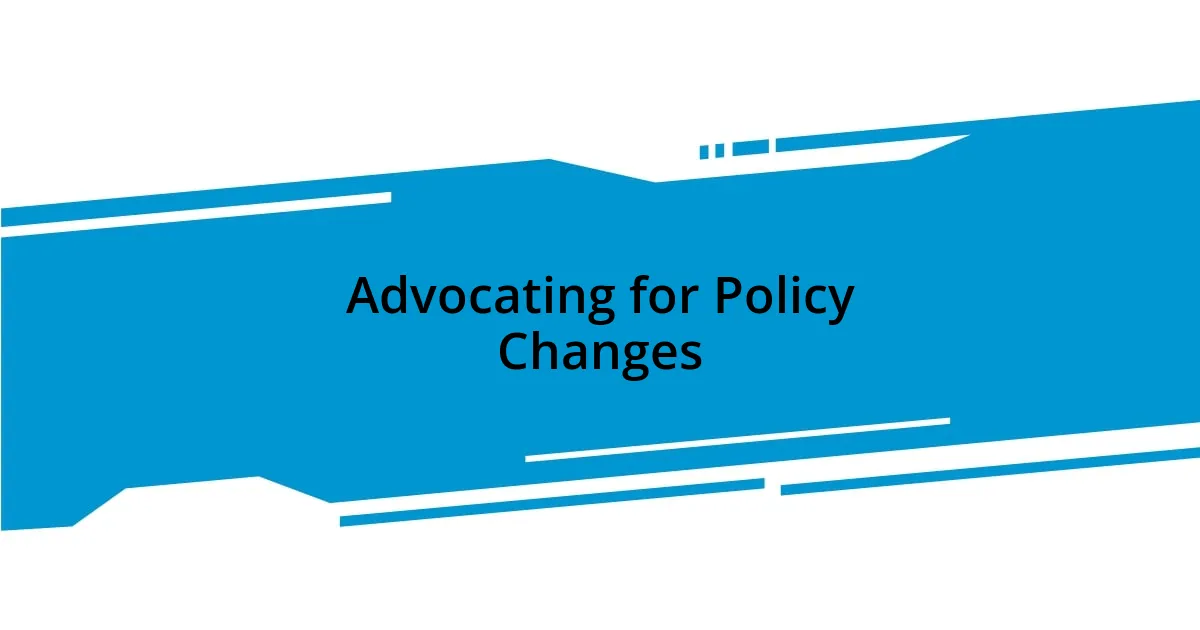
Advocating for Policy Changes
Advocating for policy changes on climate is something I passionately believe in. I remember my first visit to a town hall meeting where climate legislation was on the agenda; I was struck by how energized the community was. The discussions pointed out that while individual actions are vital, we cannot underestimate the power of policy to catalyze broader change. Have you ever found yourself in a room filled with passionate advocates? It creates an electric atmosphere that makes you want to contribute even more.
Participating in advocacy groups has been a game-changer for me. Joining a local coalition focused on climate policy opened my eyes to the complex interplay between grassroots movements and institutional change. The first time I penned a letter to my representative, I felt a thrilling mix of anxiety and empowerment. It was a small act, but knowing I was contributing to a larger voice for climate justice gave me hope. How often do we realize that our words can influence decision-makers?
It’s compelling to see how policy changes can lead to communal benefits. When our city introduced incentives for solar panel installations, I witnessed firsthand how it encouraged neighbors to invest in renewable energy. I remember chatting with a friend who, after the policy’s launch, finally took the plunge and installed panels on her roof. Seeing her excitement and the subsequent drop in her energy bills was inspiring. Isn’t it amazing how a single policy can ripple through a community and inspire actionable change?
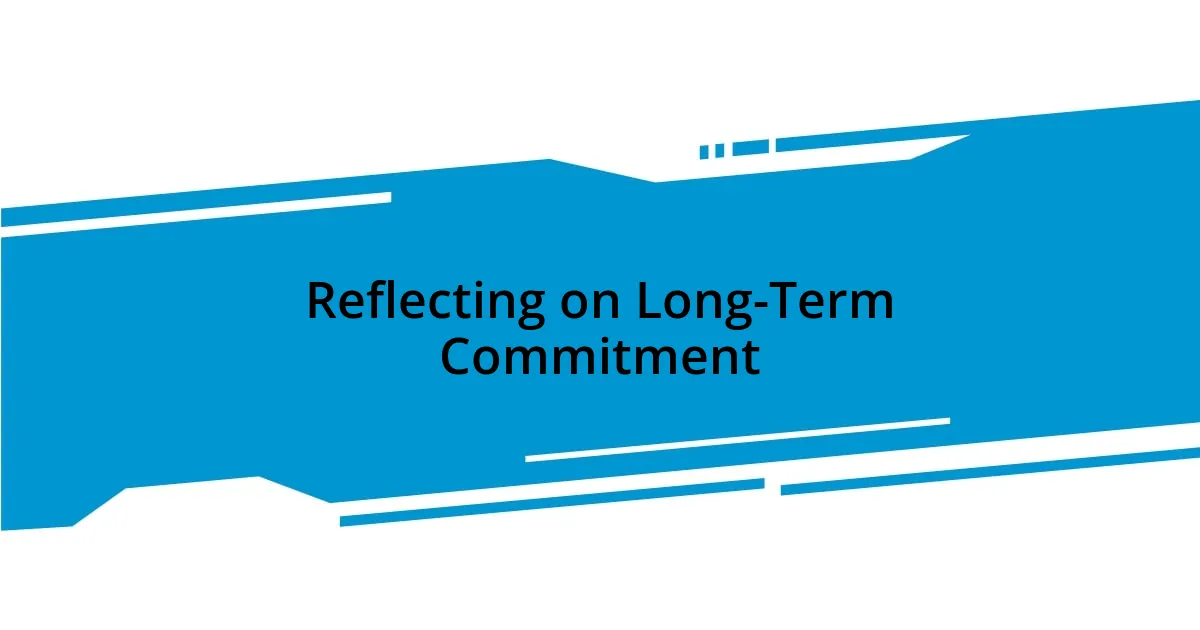
Reflecting on Long-Term Commitment
Reflecting on my long-term commitment to environmental stewardship has been quite the journey. I remember when I first decided to reduce my plastic consumption—it wasn’t easy, and I often questioned my progress. Did I really make a difference when all around me, plastic waste persisted? However, each month I tracked my successes, and slowly, those small victories became a reliable source of motivation. It’s fascinating to see how steady commitment can shift our perspective over time.
A pivotal moment came when I committed to a year of zero waste. At first, the challenge felt overwhelming; I thought, “Is this even possible?” But as I learned more about sustainable practices, I discovered how small changes could create a lasting impact. I began to relish the creativity involved in finding alternatives. For example, I experimented with homemade cleaning products, and the enjoyment of crafting my own solutions became a rewarding routine—like teaching myself the art of sustainability. Have you ever experienced that shift from doubt to passion?
Long-term commitment truly crystalizes when we realize that every action counts, no matter how minor it may seem. I recall celebrating my first anniversary of composting; friends gathered for a potluck where I proudly shared dishes that had minimal waste. The sense of achievement was profound, and it fostered conversations about our collective responsibility. Who would’ve thought that my journey would inspire others to rethink their habits? It’s a reminder that sustained dedication can flourish into a community-wide awakening.





